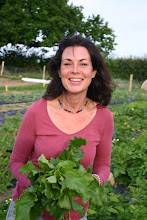I haven’t written a blog entry for ages. Too long. In fact it’s becoming a bit of a thing with me – I’m rather shy of starting again. What on earth have I got to write about, I thought as I went to stoke the Aga for my morning cuppa? Nothing more than anyone else, that’s for sure, but then that is the joy (for me) of reading diaries…peering into the hum-drumness of other people’s lives and picking out what I find interesting or reassuring.
Firstly the snow; it has to be mentioned. Who remembers snow like this so early in the year? No one I know. I love it! Last night I emptied the hot Aga riddlings into the tin bucket outside our back door and the snow was crisp and deep in the back yard. There was no moon or stars but still there was an opalescent snow light. Back in the warmth of the kitchen, huddled in a box of straw in the fireplace, was a young black hen recovering from a night out in the cold. I gave her a stroke and a drop of water from a jam jar and decided that she was definitely on the mend. A couple of intrepid Ladies of the Dicker battled their way through the snow to come and practice Christmas songs but we got no further than mulling some wine and drinking it and suddenly it was bedtime and their van was stuck in the field so Dave had to come out of his hiding place to ferry them home in the land rover.
This morning I opened the curtains and the winter wonderland had turned to brown sludge. Not a sign that we had ever had snow this week except for the children’s carefully constructed igloo which was just a sad spot of a molten memory in the field, and my friend’s abandoned van sinking deeper into the mud as I watch the torrential rain turn the field into an earthy soup.
With the weather this week I am glad that our three pigs went to slaughter last Monday. Imagine how dire it would have been for them. Freezing temperatures and then hauling themselves through an icy bog all for the sake of a pig nut or two. I’m sure I’m on dodgy ground here - because of course one can reason that death is probably not a better option than a muddy life - but we do eat meat in our family and to me it’s about the quality of the life of the meat that we eat that is important. Ours have been reared outdoors according to what the French used to call the Labour of Months. This quite simply means that you work with the changing seasons to rear, preserve and eat your pigs.
In the past if you had enough room to keep a pig and a few chickens then you could feed the family throughout the year. Pigs are omnivorous and will eat quite simply anything which they will obligingly turn into top quality meat. These days we don’t feed pigs household slops but you can feed them fruit, vegetables and nuts that come straight from the field or orchard to supplement their rusk diet. This means that they can be fed throughout the year on excess from the kitchen garden; overgrown courgettes, beetroot leaves and the like and come the autumn they are fattened on acorns and apples from the orchard including the apple cake (a.k.a. ‘cheese’) from the cider press. By the time the excess apples and acorns have run out, the pigs should be well grown enough to be sent off to slaughter at the end of November just before the really unpleasant weather sets in.
December is traditionally the time when the pig would be transformed into the preserved meats that would provide a Christmas ham and keep the family fed for the rest of the year if supplies were rationed. These days, even those who keep pigs tend not to use traditional preserving methods because it is easiest to just apportion up the meat and store it in the freezer as oversized chops, a couple of roasting joints and some breakfast sausages made with a proprietary seasoning mix.
There is not much of a tradition of charcuterie making over here but to me it seems that the most honourable thing to do with your lovingly reared pig is to use every scrap of meat from nose to tail and trotter and the best way to do that is to preserve the meat in the myriad of ways that the traditional French Charcutier would. It has taken trial and error, quite a bit of research and some helpful courses over the last couple of years to learn the finer points of charcuterie but I’m really looking forward to working on these pigs as I think that this meat will be particularly sweet and succulent.
The pigs have been hanging in our walk-in fridge to tenderize this week. On Monday Dave will butcher them (while I go Christmas shopping) and then for the rest of the week he and I will turn the meat into saucisson, salami, chorizo, air-dried hams, fromage de tete and other delicacies that you would normally find in a French Charcuterie.
Back to today. I have just braved the gloom and downpour to go and check the hens. They are bedraggled things huddled under their hen house (which is raised off the ground on stilts). I suggestively nudged them inside but they were not ready, preferring to huddle close to Bentley, the cockerel, until he gives the go-ahead and leads his ladies to their perches. But his head count will be short of one: the little black hen did not make it and despite our best efforts she died this morning and will be buried next to a robin that Louis found frozen in the snow.












